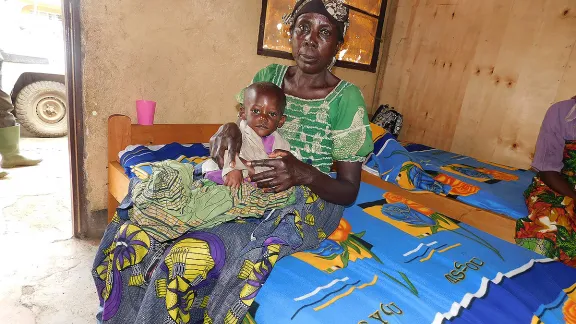
A mother and her child in one of the LWF health centers. The child is being treated for severe malnourishment. Photo: LWF DRC
Humanitarian needs have doubled since 2017
(LWI) The Lutheran World Federation (LWF) is calling partners and donors to support the emergency response in the Democratic Republic of Congo (DRC). The United Nations have indicated that DRC is facing the most severe humanitarian crisis in Africa at the moment. To increase attention for the 13.1 million people in need, a donor conference was organized in Geneva on 13 April 2018, asking governments for 1.68 billion USD for life-saving assistance and protection.
LWF has been responding in several crisis-affected areas, one of them being the Kasai region. The ACT Alliance has launched an appeal, calling to support the emergency response carried out by LWF and other partners.
“The number of people in need of humanitarian assistance has doubled in one year time due to increased violence. This has resulted in many displaced people/refugees, increased food insecurity and human suffering,” says Susan Muis, LWF Regional Program Coordinator for the Central African region.
Biggest emergency in Africa
According to United Nations (UN) estimates, 4.5 million people have been internally displaced, and more than 740,000 Congolese have fled into neighboring countries, such as Uganda. After Syria, the DRC has the highest number of internally displaced people in the world. Sexual and gender-based violence has increased dramatically. Many people have been killed or injured and hundreds of thousands are in need of psychosocial support. Because of continued violence and displacement 7.7 million people do not have enough to eat, and 2 million children are severely malnourished.
Humanitarian access
While the situations worsens, the number of humanitarian organizations has become more difficult because of kidnapping and armed violence against aid workers. Humanitarians have become victims of violence with no respect for international humanitarian law, Muis says: “Last year, 193 security incidents with an impact on humanitarian access were reported. Several NGO, including LWF, had to temporarily suspend activities. Some stopped working in the DRC altogether.”
After increasing, LWF has continued its work in Masisi and other provinces, and is now one of the few actors still able to provide aid to the people in that specific area in the DRC.
Malnutrition
The widespread violence has led to severe food insecurity. LWF is providing high-energy food for children under 5 years of age, distributing ready-to-eat nutritious peanut paste called “plumpy-nut” to acutely malnourished children. “I visited an intensive therapeutic center and saw a child of two months age weigh only 2.8 kilograms,” Muis says.
She recalls how LWF initially had identified 1,500 children for the emergency food program last year, but ended up providing for 3,000, as the needs had doubled in the meantime.
We underestimated how many children would need treatment when the project first started. We do not turn away any child that is suffering from malnutrition, and currently have been able to provide for all, because LWF ordered additional supplies in January.
“We underestimated how many children would need treatment when the project first started,” Keskaite Placide, head nurse at the LWF health center in Kahe, says. Part of the increase is due to renewed fighting in the region, which led to more people moving to an IDP camp near the health center. “We do not turn away any child that is suffering from malnutrition, and currently have been able to provide for all, because LWF ordered additional supplies in January,” Placide adds.
“In Kasai, parents bring their malnourished children from villages as far as 20 kilometers from the health center so LWF can treat them,” Muis says. In addition to the nutrition support, LWF works with the same families on improving their food security through gardening and other income generating activities.
Altogether LWF plans to provide aid for more than 58,000 people, consisting of shelter, relief goods, food, water, hygiene facilities and psychosocial support.
The emergency food programme for 3,000 malnourished children is supported by Canadian Lutheran World Relief and Canadian Food Grains Bank.
Livelihoods activities for 1,500 families are possible through the support of Church of Sweden/Radiohjälpen.


